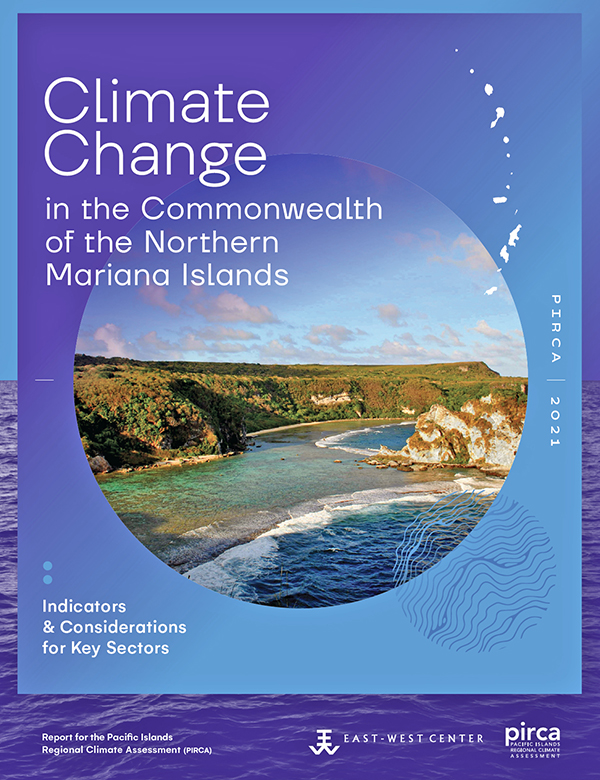100% ‘extinction risk’ for endemic species on small islands
IPCC report: Climate-related migration to increase

Climate Change measures and recommendations are available for policymakers and key stakeholders in the CNMI from the Climate Change in the CNMI: Indicators and Considerations for Key Sectors report, published last year by the Pacific Islands Regional Climate Assessment. (Contributed Photo)
Storm surges, sea level rise, flooding, coral bleaching, intense tropical cyclones, droughts—these are just a few of the observed impacts and projected risks climate change has on small islands, according to the report released by the Intergovernmental Panel on Climate Change just last Monday.
The latest report bares a desolate future for people living on the islands, whose vulnerability is amplified as terrestrial and marine ecosystems continue to xdegrade “due to negative human impacts.”
House Natural Resources committee chair Rep. Sheila Babauta, in an interview, told Saipan Tribune that the report released by IPCC is more than concerning. The IPCC warns of massive declines in population by 2100, with an “extinction risk of 100% for endemic species within insular biodiversity hotspots” including within the Pacific region, for a warming higher than 3°C.
“This is scary,” Babauta said. “They’re talking about the extinction of our people. This means that here in the CNMI, we need to respond with a sense of urgency. We need to create a plan. We need to organize and we need to stand in solidarity with other indigenous communities who face the same scary, real outcome—extinction.”
Ready to be a climate refugee?
An increase in climate-related migration is expected, according to the IPCC, as the climate change “impacts to low-lying coastal areas present serious threats to the ability of land to support human life and livelihood.”
For small islands relying on coral reef systems for livelihoods, like the CNMI, adaptation limits are projected to be exceeded before 2100, with the report painting a scenario of severe coral bleaching every year before 2040, where there will be a 99% loss of corals under a warming of 2.5°C or higher above the pre-industrial period.
This projection supports the Climate Change in the CNMI report published last year for the Pacific Islands Regional Climate Assessment, which stated that unless coral species adapt to the warming of the ocean, the CNMI will begin to experience severe bleaching beginning in about 2030.
With coral reefs and ocean ecosystems contributing to over $100 million annually to the economy—not to mention the fact that coral reefs provide and protect the CNMI coasts from waves and storms, and provides for livelihood and food security for the community—the need to act is more than urgent.
Food and water insecurities are also projected, including a decline of over 50% in the maximum fish catch potential by 2100, relative to 1980 to 2000. This is also supported by the PIRCA Climate Change report for the CNMI, which also highlighted the damage caused by recent major typhoons to crops, pollinators, ranchers, and farms.
As the ecosystem degrades, resources in small islands are also expected to decrease, impacting health, culture, the economy, food and water security—triggering migration.
What can we do?
While there are leaders in conservation and environmental management who are doing mitigation work to combat the effects of climate change on island, it is also “very important” that the CNMI be represented in “spaces where big decisions are being made, standing in solidarity with other indigenous groups in the fight to combat the climate crisis,” according to Babauta.
“One way we can do that is share our perspective and our experience with the United States military. …Because we have that unique relationship that has existed for decades, we have this opportunity to advocate for ourselves and for indigenous communities around the world.”
“The United States military is the largest polluter and largest consumer of fossil fuels in the whole world and they are exempt from many of the environmental policies, including policies that help protect our natural resources here in the CNMI, and they are exempt from reporting their emissions,” the legislator added.
The IPCC issued a Summary for Policymakers, which lays down—for leaders, key stakeholders, and policymakers all around the world—the observed and projected impacts and risks of climate change and the adaptation measures that can be implemented.
For small islands, these adaptation options include better governance and legal reforms; improving justice, equity, and gender considerations; increased finance and risk transfer mechanisms; building human resource capacity; education and awareness programs; and integrating indigenous knowledge and local knowledge, and cultural resources into the decision-making processes.
For policymakers and stakeholders in the CNMI, in particular, the Pacific Islands Regional Climate Assessment issued a report laying out indicators and action considerations that can be implemented by the CNMI to address climate change head on.
The PIRCA report, Climate Change in the CNMI: Indicators and Considerations for Key Sectors, can be accessed by visiting https://www.eastwestcenter.org/publications/climate-change-in-the-commonwealth-the-northern-mariana-islands-indicators-and. For the full IPCC report, visit https://www.ipcc.ch/report/ar6/wg2/.























